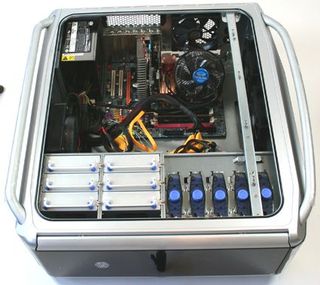CoolerMaster is showing off a new version of its excellent Cosmos 1000 case at CES, tweaked for maximum performance. Designated Cosmos 1000 S, this unit is a standard Cosmos 1000 with some interesting modifications.

The normal Cosmos 1000 features acoustically insulated side panels and puts two fans on top, one at the top rear.
The Cosmos S has been modified to trade off quiet operation against maximum airflow, so that serious overclockers can use the case without worrying about temperature build-up inside the case. To that end, the top rear fan found in the Cosmos 1000 is shifted up to the top of the case, which puts three 120mm fans in-line inside the case top, surmounted by an aluminum mesh cover designed to maximize air outflow. There's still a fan at the front bottom of the case, and the power supply fan at the rear bottom supplies a second air intake to maximize airflow from top to bottom of the case. Likewise, the case still offers e-SATA, Firewire, audio, and USB connectors on the top front, and except for the top cover, its looks are largely unchanged.
The acoustic foam has been removed from the side panels, which increases noise output, but also provides better heat exchange through the side panels. Internal drive cages have been slightly rearranged to improve airflow, based largely on feedback from users of the Cosmos 1000, and the interior construction is now all-aluminum instead of sheet steel. The result is a light, strong case, with lots of room for drives (6 x 5.25" bays, 6 3.5" bays, plus an additional bay that can serve either 3.5" or 5.25" devices as the builder may desire.
We're not sure how well the Cosmos 1000 S will deliver on its implicit promise to support high-performance, air-cooled builds, but based on our experience with the prior model, we find ourselves itching to try it out and see how it works. For those who don't want to wait for CoolerMaster to build enough of them to send us a review unit, the Cosmos 1000 S-model should be shipping some time in the next month or two, and is expected to retail for $249 (the plain-vanilla Cosmos 1000 goes for just under $200).
Stay on the Cutting Edge
Join the experts who read Tom's Hardware for the inside track on enthusiast PC tech news — and have for over 25 years. We'll send breaking news and in-depth reviews of CPUs, GPUs, AI, maker hardware and more straight to your inbox.
Ed Tittel is a long-time IT writer, researcher and consultant, and occasional contributor to Tom’s Hardware. A Windows Insider MVP since 2018, he likes to cover OS-related driver, troubleshooting, and security topics.
Most Popular







